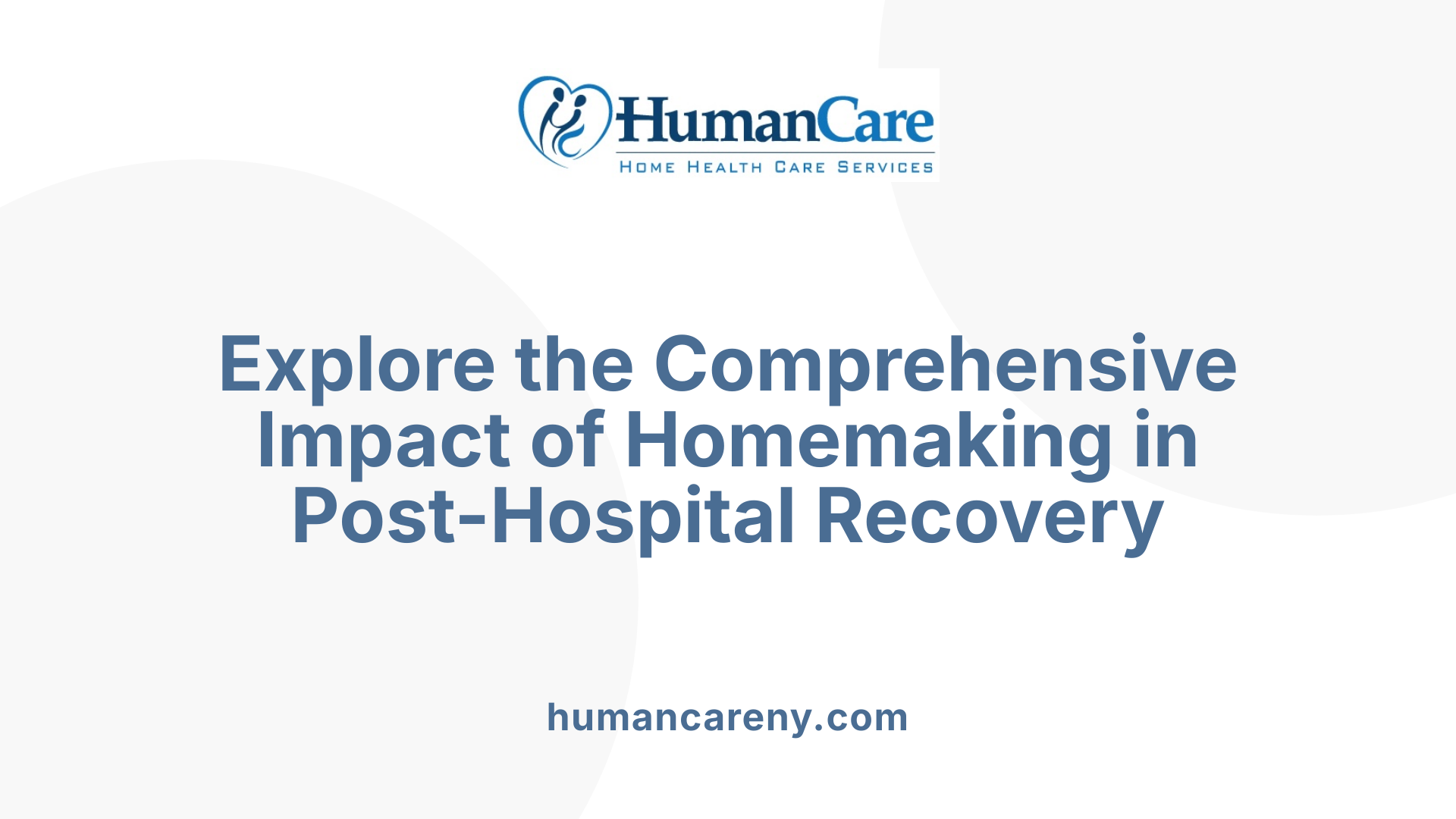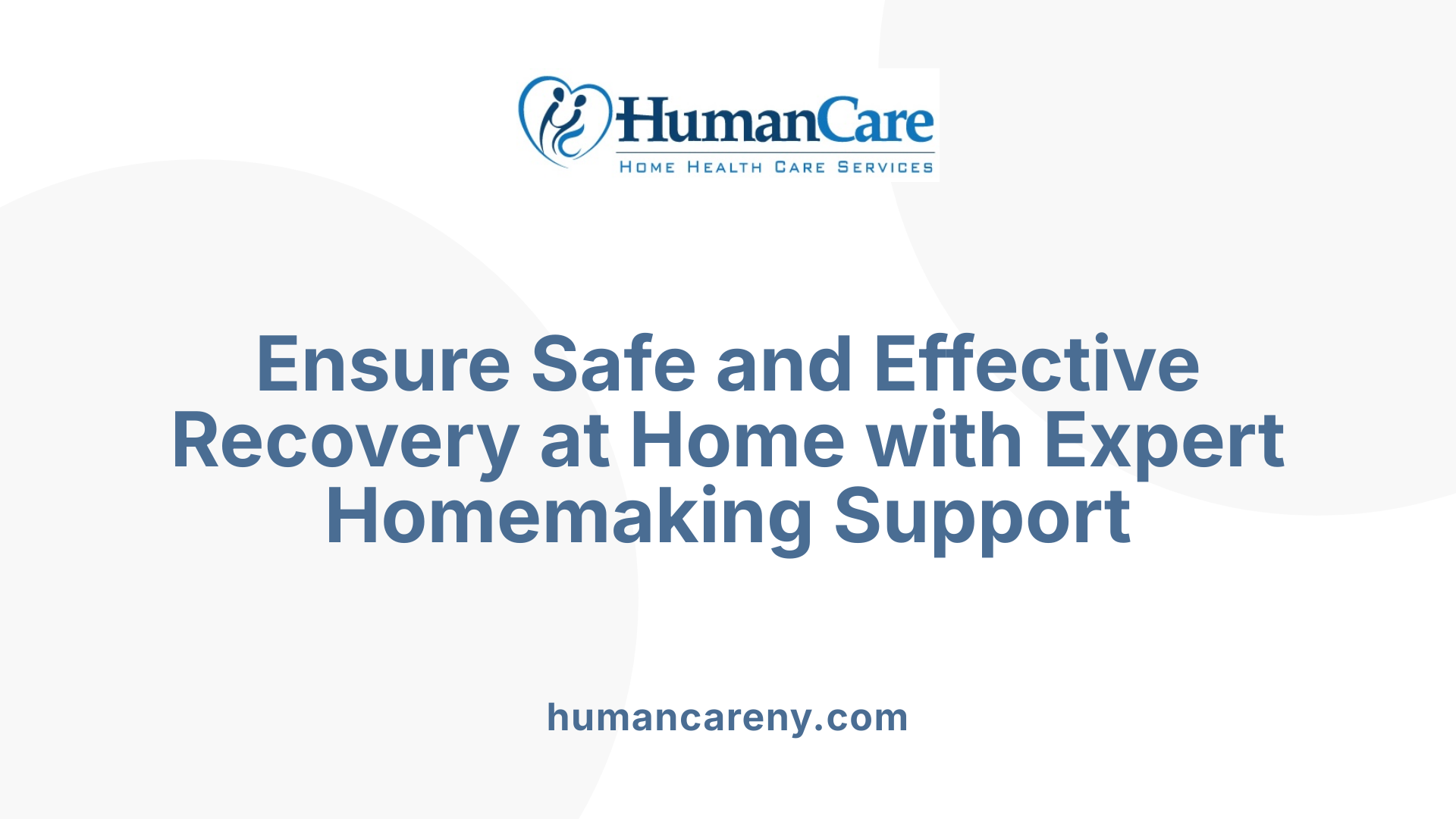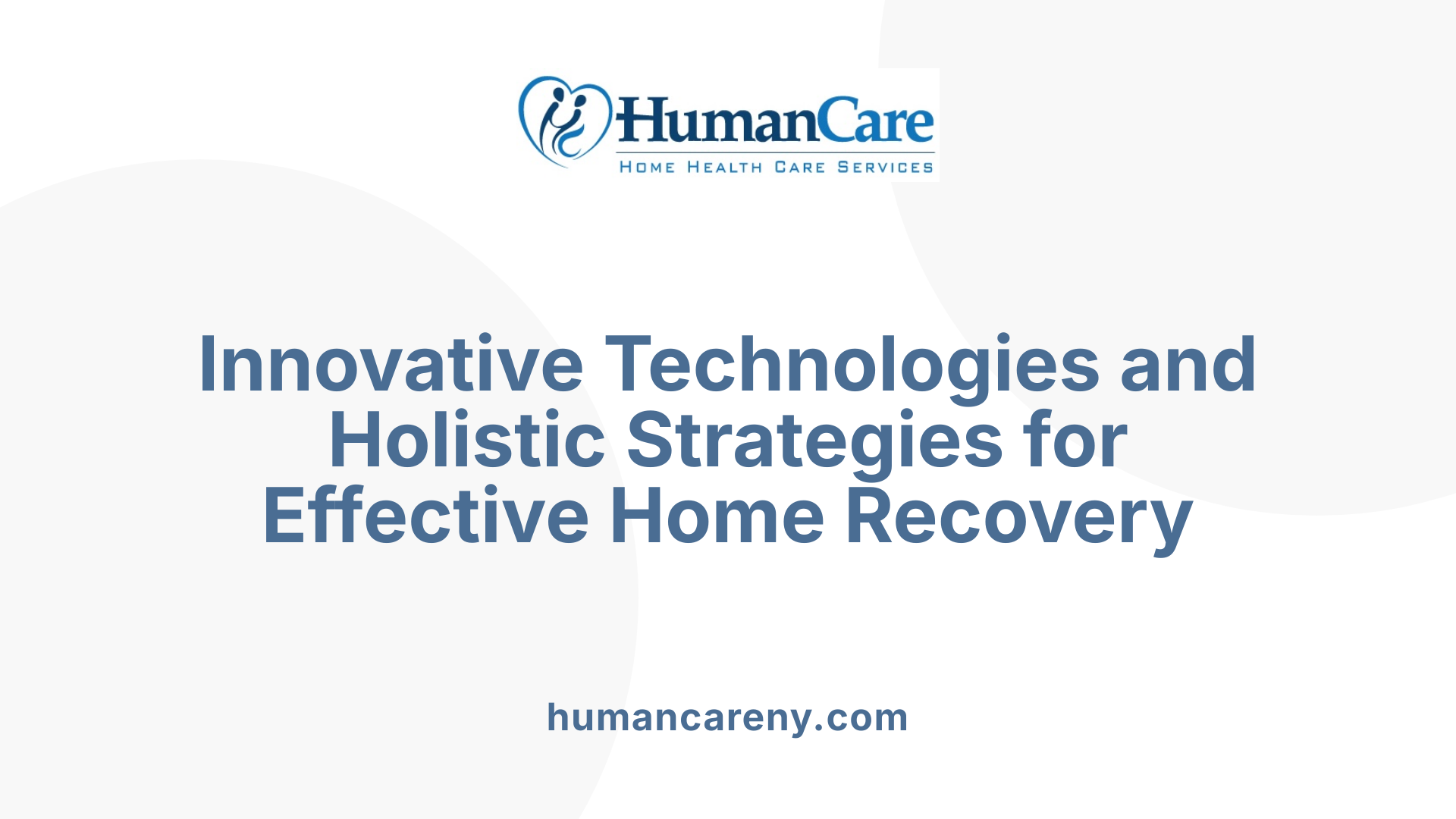Understanding the Critical Role of Homemaking in Post-Hospital Recovery
The transition from hospital to home is a pivotal phase in a patient’s recovery journey. Homemaking care, facilitated by skilled caregivers and advanced technologies, plays an essential role in ensuring safe, effective, and holistic recovery. This article explores how homemaking activities and home care services contribute to improved health outcomes, emotional well-being, and overall quality of life after hospitalization.
The Multifaceted Role of Homemaking Care in Recovery

What is the role of homemaking care in supporting post-hospitalization recovery?
Homemaking care is a vital component of successful recovery after a patient leaves the hospital. It offers personalized, compassionate support that addresses physical needs, emotional well-being, and safety—all within the familiar environment of the home. Caregivers assist with daily activities, manage medications, perform wound care, and support mobility, ensuring the recovery process is smooth and effective.
By helping with activities of daily living, such as bathing, dressing, and grooming, homemaking care promotes independence and dignity. They also manage household tasks like cooking, cleaning, and errands, reducing the burden on patients and their families.
The integration of advanced technology enhances this care model. Tools such as telehealth, remote monitoring devices, and home surveillance allow for continuous health assessment and quick communication with healthcare professionals. This real-time data facilitates early detection of potential complications, thereby preventing hospital readmissions.
Emotional support is another crucial aspect. Caregivers provide companionship, reassurance, and encouragement, which can significantly reduce feelings of loneliness and anxiety. This emotional stability fosters a positive mindset that supports physical healing.
Moreover, continuous oversight of medication intake and wound healing helps avoid issues like infections or medication errors. Mobility assistance, including help with transfers, walking, and prescribed exercises, minimizes the risk of falls and promotes physical strength.
In summary, homemaking care sustains a holistic approach by combining practical help with emotional support and technological integration. This comprehensive assistance not only accelerates recovery but also enhances the overall quality of life during the post-hospitalization phase. It reduces healthcare costs, lowers the risk of complications, and paves way for a safer, more comfortable return to everyday life.
How Homemaking Care Enhances Recovery Outcomes

How do homemaking and home care services contribute to improved recovery outcomes after hospitalization?
Homemaking and home care services play a crucial role in boosting recovery success following hospitalization. By delivering personalized medical and supportive care within the familiar and comforting surroundings of home, these services greatly enhance patient satisfaction and emotional well-being.
One of the significant benefits is the prompt management of wounds, medication adherence, and physical therapy. Caregivers routinely monitor wounds to prevent infection, remind patients to take medications correctly, and assist with mobility exercises. These measures help foster faster physical recovery and lower the risk of complications.
Research indicates that home care can reduce hospital readmission rates by approximately 15-20%. This decrease in readmissions is particularly noticeable after surgical procedures and in managing chronic illnesses, where continuous support and early intervention are vital.
Furthermore, home-based care supports maintaining and improving functional independence. Patients often regain mobility quicker and achieve better overall health outcomes when they heal in a familiar setting. Emotional wellness is also bolstered through companionship, reassurance, and emotional support, promoting a positive environment conducive to recovery.
Cost savings are a noteworthy advantage. With fewer hospital stays and fewer complications, healthcare expenses decrease significantly. These savings benefit not just patients and families but also healthcare systems, allowing resources to be allocated more efficiently.
Ultimately, homemaking services combine medical oversight with emotional and logistical support, resulting in safer, faster, and more effective recoveries. They empower patients to regain independence and confidence as they heal, leading to better health and quality of life.
What specific aspects of homemaking care influence recovery?
| Aspect | Influence on Recovery | Additional Details |
|---|---|---|
| Personalized care plans | Tailored to individual needs and conditions | Ensures appropriate support and resource allocation |
| Support with daily activities | Promotes healing by reducing physical strain | Helps with bathing, dressing, and mobility activities |
| Medication and wound management | Prevents infections and complications | Routine checks and adherence reminders |
| Emotional support | Reduces stress and anxiety | Companionship, empathetic listening, reassurance |
| Physical assistance | Accelerates mobility recovery | Assist with walking, exercises, and transfers |
How does home care impact hospital readmission rates?
Studies from various health systems reveal that comprehensive home care services can cut hospital readmission rates by about 15-20%. This reduction is achieved through timely intervention, early detection of health issues, and continuous support, which prevent health deterioration that often leads to rehospitalization.
Effective medication management, wound care, and monitoring vital signs at home are instrumental in catching problems before they escalate.
Medical research published in respected journals like the Journal of the American Medical Association confirms that structured home care programs enhance recovery while decreasing the burden on hospitals, ultimately saving costs and freeing up vital medical resources.
How does home care promote functional independence?
Home care services enable patients to perform daily tasks and movements more safely and confidently, fostering independence. Assistance with mobility, physical therapy, and routine activities accelerates physical recovery.
This support helps prevent deconditioning and muscle atrophy, common concerns after hospitalization, especially in seniors.
The familiarity of home environments also encourages emotional resilience and motivation to regain autonomy.
What are the cost implications and healthcare savings associated with home care?
By reducing the need for prolonged hospital stays and preventing complications, home care significantly cuts healthcare costs.
A typical hospital stay costs considerably more than home-based care for similar recovery periods, with savings often estimated at 20-30%. This decrease in expenditure not only benefits healthcare facilities but also reduces financial burdens for patients.
Fewer hospital readmissions and infections relieve pressure on medical resources, allowing hospitals to allocate care to the most critical cases.
In summary, integrating homemaking and home care services into post-hospital recovery strategies enhances outcomes, reduces costs, and fosters patient independence, ultimately leading to healthier, more satisfied patients.
Ensuring Safety and Effectiveness at Home Through Homemaking Care

How does homemaking care support daily safety and recovery?
Homemaking care plays a vital role in ensuring safe and effective recovery at home by offering personalized assistance with daily routines. Tasks such as bathing, dressing, grooming, and mobility support help prevent accidents like falls and wounds, creating a safer environment for healing.
Caregivers, including Homemakers and Home Health Aides, are often supervised by registered nurses to coordinate care plans that suit individual needs. Their involvement in medication management and wound care ensures treatments are followed correctly, reducing risks of infection or complications.
Maintaining proper hygiene, nutritional intake, and activity routines are crucial for recovery. Homemaking caregivers help reinforce these routines, promoting independence and well-being. Emotional support from caregivers also reduces stress and anxiety, which positively impacts physical healing.
Support services such as transportation to medical appointments, emergency alert systems, and respite care are essential components. They facilitate consistent follow-up medical care, lessen caregiver stress, and prevent unnecessary hospital readmissions.
Homemaking care integrates medical support with daily assistance and companionship, forming a comprehensive approach that enhances safety, speeds healing, and helps patients regain independence in their familiar home environment.
How do caregivers assist with medication and wound management?
Caregivers are trained to manage medications accurately—reminding patients to take their pills, organizing medication schedules, and monitoring for side effects. They communicate concerns with healthcare providers to ensure ongoing safety.
Wound care, including dressing changes, cleaning, and monitoring for signs of infection or reopening, is performed regularly. Proper wound management promotes healing and reduces infection risks.
Timely interventions by trained caregivers can detect early signs of complications, allowing prompt medical response and avoiding hospital readmission.
What measures are taken to prevent falls and enhance mobility?
Caregivers support safe mobility by assisting with transfers, walking, and prescribed exercises. They also implement safety measures like installing grab bars, removing tripping hazards, and ensuring adequate lighting.
Regular physical activity and mobility exercises help maintain strength and balance, reducing fall risks. Maintaining a clutter-free, hazard-proof environment is integral to safety.
How does homemaking care contribute to emotional well-being?
Emotional support is a cornerstone of homemaking care. Caregivers provide companionship, listen empathetically, and motivate patients, which can significantly reduce feelings of loneliness or depression.
A familiar presence helps boost morale, encourages positive mental health, and fosters a sense of security—factors that are crucial during recovery.
What home environment modifications enhance safety?
Creating a safe home environment involves installing grab bars, non-slip mats, proper lighting, and removing clutter or tripping hazards.
Adjustments such as ramps or stairlifts may be necessary depending on mobility needs. These modifications support independence and prevent accidents.
| Aspect | Implementation | Benefits |
|---|---|---|
| Daily Support | Bathing, dressing, grooming | Promotes hygiene, independence, and safety |
| Medication & Wound Care | Reminders, dressing changes | Ensures proper healing and reduces complications |
| Fall Prevention | Home modifications, mobility support | Minimizes risk of falls and injuries |
| Emotional Well-being | Companionship, motivation | Enhances mental health and morale |
| Environment Modifications | Grab bars, lighting, clutter removal | Creates a safe, accessible living space |
This comprehensive approach to homemaking care significantly reduces risks, promotes speedy recovery, and supports patients in maintaining dignity and independence at home. Implementing these measures involves coordinated efforts from caregivers, healthcare providers, patients, and families—ensuring a tailored and effective recovery experience.
The Benefits and Responsibilities of Post-Hospital Homemaking Care

What are the benefits of receiving homemaking and home-based care after hospital discharge?
Receiving homemaking and home-based care following a hospital stay offers numerous advantages for patients. It plays a vital role in promoting independence and supporting recovery by providing tailored assistance with daily activities such as meal preparation, personal hygiene, medication reminders, and physical therapy exercises.
Home-based care can significantly contribute to faster healing and improved functionality by preventing common post-discharge complications like falls, infections, and medication errors. Studies indicate that patients receiving such support experience up to a 48% decrease in 30-day hospital readmission rates, showcasing its effectiveness in reducing the need for additional hospital visits.
Furthermore, recovering in a familiar environment enhances emotional well-being and offers psychological comfort, especially with loved ones close by. This environment helps mitigate stress and anxiety, which are common during recovery periods.
From an economic perspective, home care is often more cost-effective than prolonged hospital or skilled nursing facility stays. It leads to lower healthcare expenses and Medicare payments, particularly beneficial for patients with complex medical needs or high risk factors. Overall, transferring recovery to a home setting facilitates a holistic healing experience, blending medical support with emotional comfort.
What responsibilities do caregivers have in supporting a patient’s recovery at home?
Caregivers play a crucial role in facilitating a patient's recovery by managing a broad spectrum of responsibilities essential for safe and effective healing. Their duties encompass assisting with Activities of Daily Living (ADLs) such as bathing, dressing, grooming, and maintaining personal hygiene, ensuring patients remain comfortable and safe.
They are also central to meticulous medication management, including organizing pills, reminding patients to take medications on time, monitoring for adverse effects, and coordinating with healthcare providers to update or modify treatment plans as needed.
Mobilization support is vital, including helping patients with transfers from bed to chair, ambulation, and prescribed exercises to prevent deconditioning and promote mobility. Caregivers also perform wound care, remove hazards within the home environment, and assist with transportation to medical appointments or therapy sessions.
Offering emotional support, motivation, and companionship significantly boosts mental resilience, reducing feelings of loneliness and anxiety which can impede physical recovery. Their active involvement, active communication with healthcare teams, and emotional nurturing contribute substantially to reducing rehospitalization risks and fostering independence. Overall, committed and well-trained caregivers are integral to achieving optimal recovery outcomes and ensuring patients regain health and confidence.
Technological and Holistic Approaches in Home Recovery Support

How do technological tools and holistic approaches enhance homecare for recovery?
Technological advancements are transforming the way home care supports recovery by offering real-time, continuous insights into a patient's health. Devices such as wearable health trackers and remote monitoring systems collect vital signs, activity levels, and other health data, which are transmitted instantly to healthcare providers. This constant stream of information allows for quick responses to potential issues, preventing complications and readmissions.
Virtual health platforms facilitate teleconsultations, enabling patients to consult with healthcare professionals from their homes. This not only makes follow-up care more accessible but also promotes adherence to treatment plans and early detection of problems. Additionally, AI-driven decision support tools analyze patient data to predict health risks, assisting caregivers in planning personalized interventions.
Beyond physical health monitoring, a holistic approach integrates digital therapeutics and mental health support. Virtual therapies for stress reduction, cognitive exercises, and emotional counseling address the psychological aspects of recovery, which are crucial for emotional resilience.
Smart home innovations further improve safety and independence. Installations such as automated lighting, fall detection sensors, and voice-activated controls help mitigate physical risks, allowing patients to move freely and confidently. Social support networks enabled through social media and community apps connect recovering individuals with friends, family, and support groups, reducing feelings of isolation.
The combination of these technological tools with a holistic care approach leads to a comprehensive, personalized recovery plan. Patients receive not only medical treatment but also emotional and social support, fostering a healthier, more satisfying healing environment.
| Technology in Homecare | Functionality | Impact on Recovery | Additional Details |
|---|---|---|---|
| Telehealth Platforms | Remote consultations | Increased accessibility | Supports ongoing medical oversight |
| Wearable Devices | Monitoring vital signs | Early problem detection | Encourages patient engagement |
| Remote Monitoring Systems | Continuous health tracking | Prevents complications | Enables prompt interventions |
| AI and Predictive Analytics | Risk assessment | Customized care plans | Optimizes resource use |
| Smart Home Technologies | Safety and mobility aids | Increased independence | Promotes physical and mental well-being |
| Digital Therapeutics | Virtual therapy sessions | Mental health support | Complements physical recovery |
| Social Networking Tools | Community and support groups | Emotional resilience | Reduces loneliness |
In summary, the integration of advanced technology and holistic strategies greatly enhances homecare, making recovery safer, more personalized, and emotionally supportive. These innovations empower patients to regain independence while ensuring continuous, comprehensive care across physical, emotional, and social dimensions.
Supporting Recovery: The Future of Homemaking and Home Care
As healthcare continues to evolve, the integral role of homemaking care in post-hospital recovery becomes increasingly evident. Combining personalized support, advanced technology, and holistic care models not only accelerates healing but also enhances emotional well-being and independence. Ensuring proper caregiver training, utilizing community resources, and addressing physical and mental health needs holistically will be key to optimizing recovery outcomes. In-home care remains a cornerstone of patient-centered recovery—delivering safety, comfort, and dignity while reducing hospital readmissions and healthcare costs. Moving forward, innovative solutions and collaborative community support will further empower patients to recover effectively and regain their independence in the comfort of their own homes.
References
- The Role of Home Care in Post-Hospital Recovery - Anodyne
- The Role of Homecare in Post-Hospitalization Recovery
- How a Caregiver Supports Post-Hospital Care - Clara Home Care
- Home care after intensive care unit-discharge: global differences
- Post-Hospitalization Care | Home Matters
- Post Surgery Home Care: Safe Recovery from Hospital to Home
- 6 Advantages of Home-Based Post-Surgery Care for Seniors
- The Benefits of Recovering Close to Home: Enhancing Patient Care ...
- Hospital to Home Care Benefits: Better Recovery & Well-Being
- The Role of Private Home Care in Post-Hospitalisation Recovery



